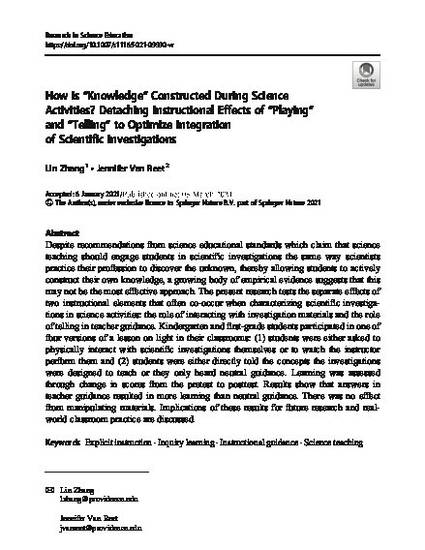
Article
How is “Knowledge” Constructed During Science Activities? Detaching Instructional Effects of “Playing” and “Telling” to Optimize Integration of Scientific Investigations
Research in Science Education
(2021)
Abstract
Despite recommendations from science educational standards which claim that science teaching should engage students in scientific investigations the same way scientists practice their profession to discover the unknown, thereby allowing students to actively construct their own knowledge, a growing body of empirical evidence suggests that this may not be the most effective approach. The present research tests the separate effects of two instructional elements that often co-occur when characterizing scientific investigations in science activities: the role of interacting with investigation materials and the role of telling in teacher guidance. Kindergarten and first-grade students participated in one of four versions of a lesson on light in their classrooms: (1) students were either asked to physically interact with scientific investigations themselves or to watch the instructor perform them and (2) students were either directly told the concepts the investigations were designed to teach or they only heard neutral guidance. Learning was assessed through change in scores from the pretest to posttest. Results show that answers in teacher guidance resulted in more learning than neutral guidance. There was no effect from manipulating materials. Implications of these results for future research and real-world classroom practice are discussed.
Disciplines
Publication Date
March 3, 2021
DOI
https://doi.org/10.1007/s11165-021-09990-w
Citation Information
Jennifer Van Reet. "How is “Knowledge” Constructed During Science Activities? Detaching Instructional Effects of “Playing” and “Telling” to Optimize Integration of Scientific Investigations" Research in Science Education (2021) ISSN: 0157-244X Available at: http://works.bepress.com/jennifer-vanreet/50/
